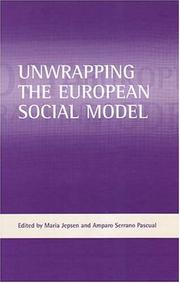| Listing 1 - 2 of 2 |
Sort by
|

ISBN: 1861347987 9781861347985 9786611159917 1447304136 1281159913 184742161X 9781847421616 9781281159915 9781447304135 6611159916 Year: 2006 Publisher: Bristol : Policy Press,
Abstract | Keywords | Export | Availability | Bookmark
 Loading...
Loading...Choose an application
- Reference Manager
- EndNote
- RefWorks (Direct export to RefWorks)
The notion of the European Social Model (ESM) has been one of the fastest growing in European political and academic discourse in recent years. It is conventionally used to describe the European experience of simultaneously promoting sustainable economic growth and social cohesion. However, the concept has suffered from a lack of clear definition. And where definitions have been found in the literature, they do not necessarily converge. This book presents the outcome of a project coordinated by the European Trade Union Institute in which experts from different countries and social scientific disciplines (sociology, political science and economics) were invited to reflect on both the meaning and political status of the concept of the ESM. In addition to analysing the ambiguities and multiple meanings attributed to the concept, the authors unpick the underlying assumptions and make use of a new approach - the ESM as political project - with which European countries can build consensus and share a common understanding. Offering a new analytical framework and with new empirical evidence, "Unwrapping the European Social Model" is essential reading for all those involved in European social policy research, education, policy and practice.
Economic development --- Social problems --- Europe --- Social policy. --- Economic policy. --- #SBIB:316.8H40 --- #SBIB:327.7H231 --- Sociaal beleid: social policy, sociale zekerheid, verzorgingsstaat --- Europese Unie: sociaal-economisch beleid, landbouw-, milieu-, cultuur- en communicatiebeleid --- Reform, Social --- Social reform --- Social welfare --- Social history --- Applied sociology --- Development, Economic --- Economic growth --- Growth, Economic --- Economic policy --- Economics --- Statics and dynamics (Social sciences) --- Development economics --- Resource curse
Book
ISBN: 3319936174 3319936166 Year: 2019 Publisher: Cham : Springer International Publishing : Imprint: Palgrave Macmillan,
Abstract | Keywords | Export | Availability | Bookmark
 Loading...
Loading...Choose an application
- Reference Manager
- EndNote
- RefWorks (Direct export to RefWorks)
The wide-ranging European perspectives collected here aim to analyse, by means of an interdisciplinary approach, the numerous implications of a massive shift in the conception of “work” and the category of “worker.” Economic crisis and digitalization have exacerbated a crisis in those categories of thought and political action that previously allowed us to discuss—and problematize—vulnerability in employment in terms of unfairness, inequality, and inadequate protection. Engaging with the deconstruction of traditional employment as a central category for theorizing the phenomenon of work, this volume explores the new semantic fields and territories that have become available for theorising, understanding, and regulating employment. These new linguistic categories have implications beyond language alone: they produce a reformulation of the conventional wisdom concerning the whole category of waged employment (aspects previously taken for granted as to the meaning of work and of being “a worker”), as well as other closely associated categories such as unemployment, self-employment, or inactivity.
Industrial sociology. --- Labor economics. --- Europe—Economic conditions. --- Linguistics --- Sociology of Work. --- Organizational Studies, Economic Sociology. --- Labor Economics. --- European Economics. --- Philosophy of Language. --- Sociology --- Industrial organization --- Industries --- Economics --- Philosophy. --- Social aspects --- Economic sociology. --- Language and languages—Philosophy. --- Economic sociology --- Socio-economics --- Socioeconomics --- Sociology of economics --- Economic Sociology.
| Listing 1 - 2 of 2 |
Sort by
|

 Search
Search Feedback
Feedback About UniCat
About UniCat  Help
Help News
News